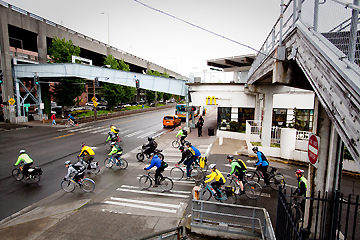
One has to wonder how long the cars had to wait for the bikes to unload on Bike to Work Day. (Photo: RedBox Pictures)
Loading and Unloading of Vehicles and Passengers
WSF is seeking ways to expedite loading operations for several reasons. Currently, bicycle loading/unloading is a challenge since they are first off the vessel and can impede the unloading of cars. This creates a safety issue, which is more important than the delay, with the anxious drivers that have waited to unload now following the bikes down the road.
Panel recommends that cars be unloaded ahead of bikes.
Safety is of the paramount importance with efficiency second. The Panel recommends that a trial project be undertaken to change the loading/unloading sequence with bicycles being loaded last and unloaded last. This allows better separation of vehicles and bicycles and gives the Mate more control over the space allocated to bikes. Bikes are also slower than cars and can slow the disembarkation of those they are in front of. By holding back bikes, it also avoids the need for bicyclists to move through the car deck with their bikes in order to get to the front of the vessel. By off loading after the vehicles, bikes will not be sharing the road at the same time as the disembarking vehicles, allowing for a margin of safety.
Let’s think about this for a minute: the very people who are helping the state comply with the Climate Law, and the VMT Law, the people who are taking up little space on the ferries and not congesting the roads around terminals – it’s those people who are a problem. They’re a problem because they hold up cars. They frustrate and delay vehicle operators. Note the code words, like "anxious drivers." (I wonder if "anxious" is a technical term and how the anxiety was measured. Did they count the number of sad faces spotted through windshields?) Despite the transparent phrasing regarding delayed and "anxious" car-users, WSF tries to phrase the issue in the context of safety. One assumes that they mean that its unsafe for bicyclists to be passed by motorists. If that’s the case, then perhaps it would be safer if we all just stopped riding our bicycles – because we all get passed by cars somewhat regularly. Snark aside, in the 79-page report, no evidence or data is presented to support the assertion that load order has any impact on safety.
Bike commuters departing the ferry are absorbed onto city streets in minutes. (Photo: RedBox Pictures)
Share this post
